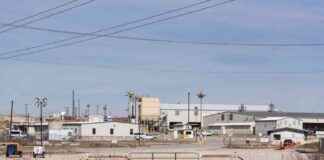In a bustling chocolate shop in Houston, Texas, a wide array of delectable chocolates gleam under the store lights, enticing customers with their rich aromas and tempting flavors. The sweet treats on display offer a glimpse into the world of chocolate, a global commodity beloved by many for its indulgent taste and comforting qualities.
Recent findings from a study conducted by independent research group Climate Central have shed light on the impact of the climate crisis on the chocolate market. The study reveals that the relentless rise in temperatures in West Africa’s “cocoa belt,” where approximately 70% of the world’s cocoa is produced, has led to significant challenges for cocoa farmers and chocolate lovers alike. The report highlights a concerning trend of escalating temperatures in the region, resulting in adverse effects on cocoa harvests and contributing to a surge in chocolate prices.
The study, titled “Climate change is heating up West Africa’s cocoa belt,” underscores the critical role of human-induced climate change in exacerbating temperature extremes in key cocoa-producing countries. The report identifies the primary drivers of climate change, including the burning of fossil fuels such as oil, coal, and methane gas, as major contributors to the escalating temperatures in West Africa. As a result, the delicate balance required for optimal cocoa growth is being disrupted, leading to potential reductions in both the quantity and quality of cocoa harvests.
Impacts on Cocoa Production
The research focused on 44 major cacao-growing regions in four key cocoa-producing countries, namely Ghana, Côte d’Ivoire, Cameroon, and Nigeria. These countries, which collectively account for more than half of the world’s cocoa production, have experienced a significant increase in the number of days with daily maximum temperatures exceeding 90 degrees Fahrenheit. Ghana and Côte d’Ivoire, in particular, have borne the brunt of the climate crisis, with an average of 40 additional days of extreme heat recorded in the past decade.
The rising temperatures have not only affected cocoa yields but have also posed a threat to the livelihoods of millions of farmers and workers who depend on cocoa production for their sustenance. The study underscores the urgent need for sustainable solutions to mitigate the impact of climate change on cocoa cultivation and safeguard the future of the chocolate industry.
Challenges and Solutions
As the climate crisis continues to escalate, the challenges facing cocoa farmers are becoming more pronounced. Changing rainfall patterns, coupled with the increasing frequency of extreme weather events, further compound the difficulties faced by cocoa growers. The unpredictability of weather conditions poses a significant threat to cocoa production, leading to fluctuations in global cocoa prices and creating additional hardships for farmers.
To address these challenges, experts emphasize the importance of implementing adaptive strategies to enhance the resilience of cocoa cultivation in the face of climate change. Measures such as breeding heat- and drought-resistant cocoa plants, implementing agroforestry practices to provide shade for cacao trees, and exploring alternative production locations with more favorable climate conditions are crucial steps in safeguarding the future of cocoa production.
In conclusion, the study serves as a stark reminder of the far-reaching consequences of climate change on one of the world’s most beloved delicacies. As temperatures continue to rise and weather patterns become increasingly erratic, the future of chocolate production hangs in the balance. It is imperative that we take collective action to address the root causes of climate change and protect the livelihoods of cocoa farmers, ensuring a sustainable future for the chocolate industry and the planet as a whole. Subscribe to get exclusive updates in our daily newsletter! By signing up, you agree to the Terms of Use and Privacy Policy & to receive electronic communications from EcoWatch Media Group, which may include marketing promotions, advertisements and sponsored content.














